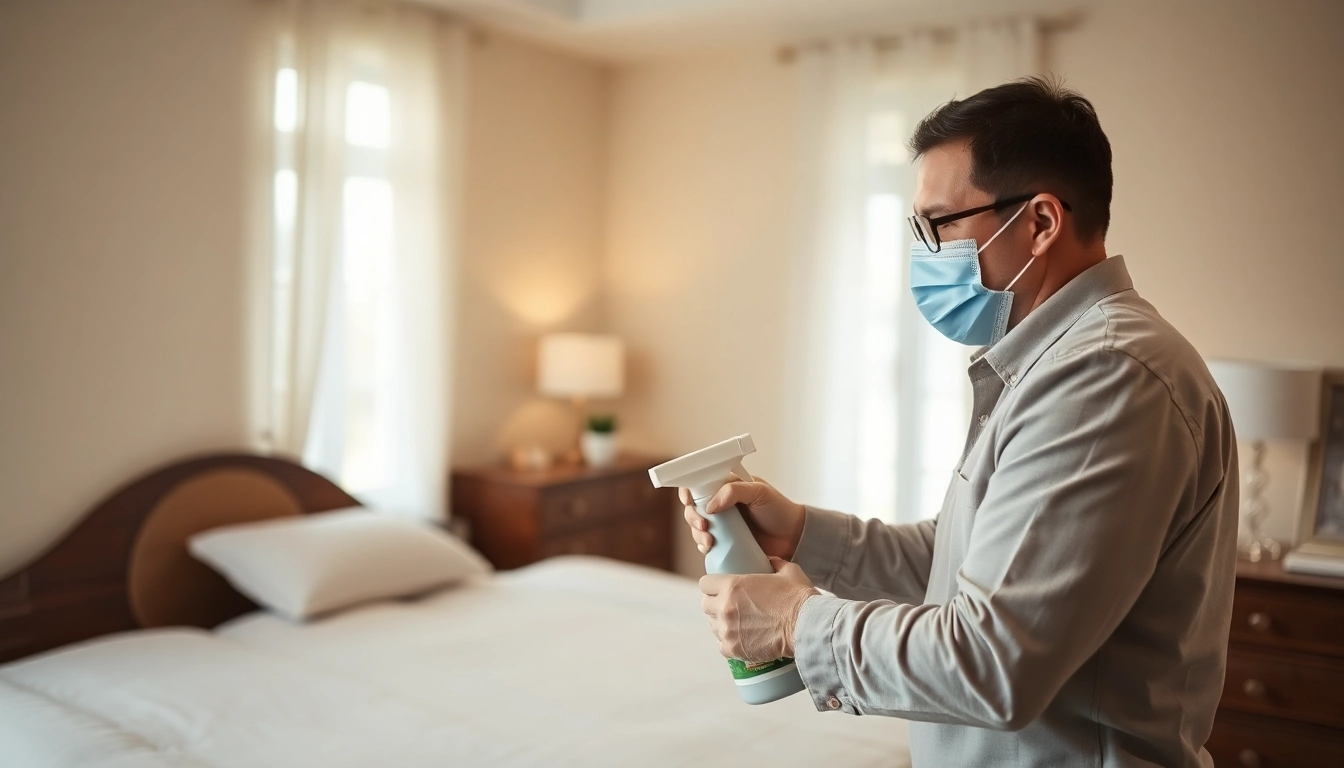Understanding Bed Bugs and Their Impact
Encountering a bed bug infestation can be a daunting experience. These tiny, elusive pests thrive in the most unexpected places, and their bites can cause irritation and sleepless nights. For those seeking effective Bed Bug Removal, understanding the nature of these insects is the first step toward reclaiming your home. This article provides a detailed guide to identifying, eliminating, and preventing bed bug infestations.
What Are Bed Bugs?
Bed bugs, scientifically known as Cimex lectularius, are small, blood-sucking insects that typically reside in the crevices of beds, furniture, and walls. Adult bed bugs are about the size of an apple seed, with a flat, oval body. They are reddish-brown, and while they are most active during the night, they can be found at any time of day. Unlike other pests, bed bugs do not transmit diseases, but their presence can lead to severe discomfort and anxiety.
Signs of an Infestation
Identifying a bed bug infestation early can help prevent a widespread problem. Key signs include:
- Bite Marks: Many people experience red, itchy welts on their skin after being bitten by bed bugs.
- Exoskeletons: As bed bugs mature, they shed their skins; seeing these can be a telltale sign of their presence.
- Dark Spots: Small blood stains or fecal matter on sheets, mattresses, or walls indicate bed bug activity.
- Musty Odor: A distinct, unpleasant smell may emanate from an infestation, which is caused by bed bug secretions and pheromones.
Health Risks Associated with Bed Bug Bites
While bed bugs are not known to transmit diseases, their bites can lead to allergic reactions, secondary infections, and significant psychological distress due to anxiety over the infestation. Victims may experience sleeplessness, leading to fatigue and decreased productivity. Finding effective treatment for bed bug bites, such as antihistamines or soothing creams, can help alleviate symptoms.
DIY Bed Bug Removal Techniques
For those who prefer to tackle a bed bug infestation on their own, several DIY techniques can be employed before considering professional help.
Effective Home Remedies for Bed Bug Removal
Some effective home remedies include:
- High Heat: Bed bugs are sensitive to temperature. Washing bedding and clothing in hot water (at least 120°F/49°C) and using a dryer on high for at least 30 minutes can kill bed bugs at all life stages.
- Cold Treatment: Exposing bed bugs to freezing temperatures can also be effective. Items can be placed in a freezer for at least four days.
- Diatomaceous Earth: This natural product disrupts the exoskeleton of bed bugs, causing them to dehydrate and die.
- Essential Oils: Certain oils, like tea tree and lavender, are reputed to repel bed bugs. While not a full solution, they can be part of a broader treatment plan.
When to Call a Professional Exterminator
While DIY methods can be beneficial, certain signs indicate it is time to call a professional. If a significant infestation persists, or if the techniques you’ve tried yield insufficient results, it’s essential to seek help from a qualified pest management professional who specializes in bed bugs. They possess access to advanced tools and techniques that can effectively eliminate stubborn infestations.
Common Mistakes in DIY Approaches
Many people make critical errors when attempting DIY bed bug removal, such as:
- Inconsistent Treatments: Partial treatments may lead to a resurgence of bed bugs since these pests can quickly adapt and reproduce.
- Overlooking Hiding Spots: Bed bugs can hide in numerous locations; thorough inspections are necessary.
- Failure to Monitor: After treatment, continuous monitoring is needed to ensure that bed bugs do not return.
Professional Bed Bug Removal Services
Enlisting the help of a professional exterminator can drastically improve the chances of fruitful bed bug removal.
Types of Bed Bug Treatment Plans
Professional services typically offer several treatment methods, including:
- Heat Treatment: Utilizing high temperatures to effectively kill bed bugs in all stages.
- Chemical Treatments: Involves the use of specific pesticides effective against bed bugs.
- Integrated Pest Management (IPM): An approach combining various pest control strategies for maximal effectiveness, emphasizing prevention alongside treatment.
What to Expect During Professional Treatments
During an initial visit, a professional will conduct a thorough inspection to determine the extent of the infestation. Following this, they will discuss the most appropriate treatment options. Typically, you can expect the treatment to last from a few hours to a full day, depending on the infestation level. After treatment, follow-up visits may be necessary to ensure complete eradication.
Cost Considerations for Bed Bug Removal
The cost of professional bed bug removal can vary widely based on factors such as the severity of the infestation, the size of your home, and the chosen treatment methods. On average, prices range from a few hundred dollars to several thousand, especially for large infestations. Nevertheless, investing in professional help can save time and provide peace of mind.
Preventing Future Infestations
Once you’ve successfully eliminated bed bugs, the next step is ensuring they do not return.
Best Practices for Bed Bug Prevention
To prevent future infestations, consider the following strategies:
- Seal Cracks and Crevices: Regularly inspect and seal any gaps in walls, floors, and furniture to deny bed bugs hiding spots.
- Use Protective Covers: Encase mattresses and box springs in bed bug-proof covers to prevent future infestations.
- Regular Inspections: Conduct routine inspections of bedding, furniture, and luggage, especially after traveling.
Daily Habits that Help Keep Your Home Bed Bug-Free
Incorporating some daily habits can help keep your space free from bed bugs:
- Keep clutter minimal as it provides hiding spots.
- Inspect second-hand furniture before bringing it into your home.
- Consider placing interceptors under bed posts to capture any bed bugs that attempt to board your bed.
Importance of Regular Inspections
Regular inspections are crucial in catching a potential resurgence early. Create a habit of checking for signs of bed bugs weekly, especially if you have had past encounters or if you live in a high-risk area.
Resources for Dealing with Bed Bugs
Various organizations and guidelines provide valuable resources for those dealing with bed bug issues.
Trusted Organizations and Guidelines
Organizations such as the U.S. Environmental Protection Agency (EPA) and the Centers for Disease Control and Prevention (CDC) offer extensive resources on bed bug control and management techniques. Consulting their websites can provide helpful insights and up-to-date information on best practices.
Community Support for Bed Bug Issues
Online forums and local community groups can offer support and shared experiences for individuals dealing with bed bugs. Platforms like Reddit or specific pest control forums can serve as valuable spaces for sharing tips and success stories.
FAQs About Bed Bug Removal
It’s common for individuals to have questions regarding bed bug removal. Below are some frequently asked questions:
- Can I remove bed bugs myself? Yes, with the right methods and dedication, you can tackle mild infestations. However, for severe cases, professional help is recommended.
- What kills bed bugs instantly? High heat, such as that from steam cleaning, and certain chemical insecticides are effective in quickly eliminating bed bugs.
- How can I avoid bed bug bites? Using protective mattress covers, avoiding infested areas, and keeping living spaces clean can help minimize risk.
Through diligent action, support, and informed game plans, anyone can effectively manage and prevent bed bugs. By utilizing the strategies outlined in this article, reclaiming your home from these unwanted guests can be a reality.



